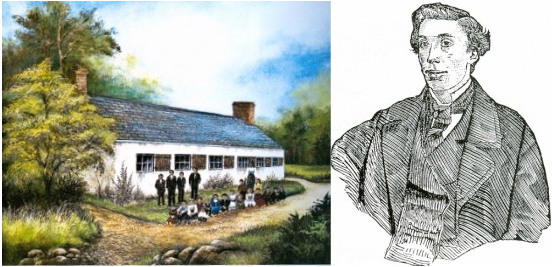The beginning of the 1859 revival in Ulster, can be traced to the parish of Connor in Co. Antrim. Here not far from Ballymena is a small village called Kells. God found Himself four weak, foolish sinners, that He saved, filled with faith, and a spirit of prayer for revival. The first was James McQuilkin who one day overheard a conversation between two ladies, one being Mrs Colville, a Baptist missionary from England. Mrs Colville spoke to a lady about assurance of salvation. James, feeling that there was a lack of theological understanding asked Mrs Colville if she was a Calvinist. She responded by saying, "I do not care to talk on mere points of doctrine. I would rather speak of the experience of salvation in the soul. If one were to tell me what he knows of the state of his heart towards God, I think I could tell him whether he knows the Lord Jesus savingly." This conversation led to James falling under deep conviction of sin. He was cut to the heart and led into long weeks of agony as he wrestled over his spiritual condition before God. Finally he came through to salvation, peace, and forgiveness. Immediately he began to witness to others around him and the news spread in Kells that this man who was once known for his love of the world, now loved Christ and His Word.
One of McQuilkin’s friends, Jeremiah Meneely (or Jerry as he was well known) was a faithful church goer but lacked a sure knowledge that his sins were forgiven. Having heard about his friend’s transformation, he sought for him. After a long conversation with James, Jerry found himself in a state of seeking God. As he read the Bible one day wrestling over these things and confused in mind, the Spirit spoke a scripture clearly to his heart. He slapped his knee exclaiming, "I see it now" and arose assured of his sins forgiven and of his name written in Heaven. Around the same time McQuilkin led two other young men to Christ, Robert Carlisle and John Wallace. These four new converts were God’s raw material.
James McQuilkin sent off for George Muller’s book, a narrative of his life and labours called, Life of Trust and this had a profound effect upon him in starting the prayer meetings. He also read, The Life of McCheyne and Finney's, Lectures on Revivals sowed deep seeds of hunger for genuine Heaven-sent revival.
Beginning in September 1857, these four banded together in a bond of fellowship to meet weekly for prayer and Bible study. Their sole desire was their own edification and the salvation of others around them. The simple place they chose to meet was the Schoolhouse at Kells. "During the long winter of 1857-1858 every Friday evening, these young men gathered an armful of peat each, and taking their Bibles made their way to the old schoolhouse. There they read and meditated upon the Scriptures of truth and with hearts aflame with a pure first love, poured out their prayers to the God of heaven." Everything that they steadfastly held to over the next year centred around three great fundamental truths of scripture, these were "the Sovereignty of the Holy Spirit, the Sufficiency of the Holy Scripture, and the Secret of Holy Supplication." This not only marked those small fervent prayer meetings but soon covered the whole land in living manifestation as God stepped down and marched through the land.
These prayer meetings continued with no visible results for three months, but on New Year’s day, 1858 the first convert was brought in. After that others were born from above and now joined the prayer meetings. By the end of 1858 about 50 men were meeting with them to wrestle and prevail in prayer. The one cry and burden of all their prayers was for an outpouring of the Spirit upon themselves and the surrounding area. They were hungry and determined to pray through to God. Many of the local church people ridiculed, mocked and opposed this type of praying. They were happy to rest back and do nothing. They believed that 'the Holy Spirit was given at Pentecost so we don't need to pray for the Holy Ghost.' Such a stagnant attitude never brings Revival.
But the small band prayed on determinedly, unmoved by the theories and theologies of man. The women did not attend these initial despised meetings because of the reproach. Soon they were holding cottage meetings until no cottage was big enough. Then they held open-air meetings, and slowly and quietly the work of God was carried on.
TO BE CONTINUED…
READ NEXT WEEK of a revival which spread out across the whole land, family by family, village by village, and town by town...

 RSS Feed
RSS Feed